generation hope
a podcast from connect.faith“Meeting the Technical with Humane” Gianna Durante | Generation Hope | Generation Hope | connect.faith
This week on Gen Hope, Cali spoke with Gianna Durante, who is pursuing her master’s degree in Stage Management at Columbia University. Gianna shares her insights on finding her passion and seeing it through as a young person.
—
“And there’s no one way to do anything. And everyone comes to the table with their own strengths and energy and spirit and personality. And don’t let anyone take that away from you and don’t let anyone make you feel like the skills that you have aren’t good enough because they can always be developed and they can always be worked on and you can always learn new things too, but you bring your own spirit to everything.” -Gianna Durante
Transcript
[00:00:00] Cali Bronkema: Welcome to Generation Hope a podcast by connect.faith. This season, we’re talking to young adults who are pursuing careers that don’t always have linear paths to entry.
[00:00:12] We’ll be talking to musicians, visual artists, and others about the unique challenges and rewards young creatives can face as they turn their passion into a career.
[00:00:34] Cali Bronkema: So today I’m talking to Gianna Durante who is a student at Columbia University, going for her Master’s Degree in Stage Management. Thanks for joining me Gianna.
[00:00:46] Gianna Durante: Thanks so much for inviting me here, I’m so excited to see you and talk to you about this.
[00:00:52] Cali Bronkema: Yeah, I’m excited too. Let’s just start by you telling us a little about who you are and why you decided to go to Columbia.
[00:01:04] Gianna Durante: My name is Gianna. I use she/her pronouns. I’m originally from Pleasantville, New York where I went to, through high school.
[00:01:13] Eventually after graduating, I went to SUNY New Paltz to pursue art education. I’ve always been interested in the performing arts. I was a dancer when I was young for 11 years, I was always involved in theater to some capacity.
[00:01:27] I used to want to be a performer when I was young, but being an angsty, middle schooler and going into high school and not really knowing exactly what I wanted to do. I was told by an upperclassmen to take a painting class with Mr. Maron and that class, my first year of high school basically changed my life.
[00:01:46] I realized that I loved painting and visual arts. I was never as technically skilled as I, as my peers and as I would’ve liked to be, but I pursued painting and with like the support of all of the teachers at Pleasantville High School I was really encouraged and inspired to pursue it and like how Mr. Maron was such a role model for me. I really wanted to be that for someone else.
[00:02:10] So when I was a junior in high school Mr. Maron recommended me to be the Assistant Stage Manager on the school’s show as the Director Kathleen Warren was looking for a creative and organized student to take over that position. So he, I think he probably beats himself up over this for suggesting my name, because this was the moment that he lost me to the performing arts.
[00:02:37] I fell in love with stage management. I didn’t know exactly what it was, but I was told that I was going to be the first one in the room and the last one to leave. And the leader of the company of artists the creatives and the performers and that was really interesting to me because I just really wanted to be involved and kind of like be in charge of something and like have all the information.
[00:03:00] And that was something that as a young student with no control over their life at all what sounded really interesting to me. So, I was a Assistant Stage Manager for the musical that year and the next year I was the production stage manager with an awesome assistant that I still love to work with Kiara Vedovino.
[00:03:20] And from there I still went to New Paltz intending to pursue art education. And after my first year of art education, I really liked being able to express my creativity, but it just felt a lot I was lacking a lot of the skills that my classmates had and they had been drawing and technical artists, their whole life. And for me, I was just kind of new at it and pretty much just slapping paint onto a canvas at this point, hardly sketching or doing any drawing anything realistic to be completely honest.
[00:03:55] I didn’t really feel like I was getting the support that I needed from them. I wanted to be able to express myself creatively, but it wasn’t really fulfilling for me because the assignments were very technically oriented and it wasn’t something that I was succeeding at.
[00:04:07] And I was really hard on myself and not that I wasn’t getting good grades per se, but I wasn’t really, they were continuing to challenge me to start from the beginning where I would’ve liked them to challenge me at the place that I already was to develop my skills in that way. So at the end of the spring semester, I saw a production of Avenue Q that the theater department put on and I was really jealous that I wasn’t a part of it.
[00:04:36] It was really good and one of the actors, Jamie Glickman from my school was actually recruited to be on the off-Broadway production. So it was, it was really, really well done and I really wanted to be a part of it so I went to the head of the department the next day, and I said, I really want to be involved in this. I’m a visual arts student. I don’t know if I necessarily want to change career paths, but if there’s any way I can get my hands in this, I would absolutely love to do that. So he ended up pushing my application through to become a major, just so that I could take the tech and design class that met at 8:00 AM two days a week.
[00:05:14] It was a really thrilling class and they were just peaking my interest in the ways that the art department wasn’t really wasn’t really working for me. They were challenging me in ways that I felt like I already appreciated and, and skills I already personally had. So I was just developing skills and practicing these muscles that were already within me. They were always willing to work with me and find out what I wanted to do.
[00:05:38] And after you know, two years of being in the theater department at school the pandemic hit and I had realized that coming into theater so late, I didn’t really have the connections that I would have needed to get a job straight out of graduation.
[00:05:55] I didn’t really, I wasn’t doing summer stock, I wasn’t in that many productions outside of school during the summer and things that my peers had worked really, really hard to do, especially as a stage manager. I know a lot of my classmates now have been putting in the work to get these jobs and to meet people’s like since a pretty young age, they knew that he wanted to do this for a while. And I really admire and respect them for that. And they have put in a lot of work to make these connections and they have, they have a lot of contacts and networking that they, people they still keep in touch with.
[00:06:25] So I decided that in order to make those connections one path would be to go to graduate school. At the end of the my second year of school, we had a department wide meeting. And it was fine. I remember kind of zoning out through all of it. It wasn’t anything necessarily about like the future or anything like that, it was just kind of just keeping us involved in the decisions that were being made on in the program that year. And at the end of the meeting my professor professor Varga said, and you know, you, you never know you when you go to grad school of blah, blah, blah, blah, blah.
[00:07:00] And I was like, when I go to grad school, what do you mean by that? Like, I’m not going to grad school. Like, and I was really stressed out overwhelmed after that. And it was not something that I saw myself doing at all. And I went to my professor and she assured me that it’s not something that you necessarily need to do, but if you want to further your education and you want to meet people it’s a really good way to practice and to just get your foot in the door.
[00:07:22] She also told me that Columbia was one of the best schools, probably that she recommended that I personally look at because she thought it would be a good fit for me. COVID really solidified that idea for me, just because I knew there wasn’t really going to be a chance for me to do that networking and get those jobs that I really would’ve wanted the same way that I would have in a season prior.
[00:07:45] I ended up getting a job though in the summer during COVID and most of it was on Zoom, which wasn’t really fulfilling for me. It was hard for me to stay engaged. And it was at a children’s theater and I really loved it and the kids were extremely talented at the summer theater of New Canaan and I was the production stage manager there with four other interns and it was a really good experience.
[00:08:07] It was a lot of fun. But I knew that it wasn’t really going to be enough on my resume necessarily to get me a job. And with like the unforced, like an unknown future that was coming with COVID it was like, how long are we going to be on Zoom? I’d rather go to school, continue my education. Even if it is on Zoom, I would be willing to, to sacrifice that, to meet the professors, get the education, get the knowledge and then perhaps by the time I graduated, the world would be opened up and ready for me. And I would be able to have an MFA and, and be able to start applying for jobs. So I thought that was a cool option. I didn’t realize how grateful I would be for it to be in person especially after applying and then having to finish my senior year on Zoom was really a struggle and really difficult to pay attention. Being able to be fully in person the last five months has been such a blessing and having these connections in person has just changed everything. I know the second years in the program definitely don’t didn’t get the same experience because they spent their entire first year on Zoom and I can kind of see how that would like be really detrimental to their education and to the connections that they’ve made here and my classmates and I have been really, really fortunate to have been in person this whole time.
[00:09:26] Cali Bronkema: I love that although you changed paths, at no point did you consider doing something that didn’t tap into the creative side of you and the art side of you.
[00:09:38] Have you, you know, you mentioned you, you were a dancer when you were little, did you always picture creativity and art and performing to be what you wanted to do work-wise or was there a point when you were like, yes, let’s make this into a career instead of a hobby?
[00:10:02] Gianna Durante: At the point that I was a dancer and that I was working in theater, when I was younger, prior to high school, I never saw it as a career I just saw it as something on the side, something fun to do. But I think also at that age, I wasn’t didn’t really know what I wanted to be, or didn’t really think about what, like I wanted to be when I got older. When I discovered art, I knew that I loved it and I found a way to turn that into a career.
[00:10:28] I think I was really inspired by how Mr. Maron was able to find something in me that he saw that was going to be valuable and how he really was able to kind of, I mean I was struggling with undiagnosed ADHD for the majority of my youth. I wasn’t diagnosed until I was a freshman in high school and so struggling with that and not really having interest in a lot of things in school, not being able to pay attention was really hard for me and I didn’t really have an interest in school. And I wasn’t very good at school at all even like my first year of high school, I think I had like grades that were in the seventies, like I think I had a C my first, like two years and that’s not horrible. And, you know, looking back from like where I am now (Cali: literally at Columbia) yeah, at Columbia and like, those aren’t bad grades though, when you’re in high school, like there’s so much growth to be done, but like, it wasn’t until that I found that there was something going on in my head that I, that there was something and it wasn’t just me necessarily.
[00:11:32] Like there was something that was preventing me from getting the best of my education. And so when I found art and when I found a person that was able to care about me in the educational setting, like no one else, the, I didn’t really have a connection with any of my other teachers growing up. But Mr. Maron and I, he, he knew that I was struggling and painting was an outlet for me to take the chaos that was in my head and like visualize it and make it something that was tangible and digestible for me. So it wasn’t necessarily art that I wanted to be my career at first, but it was, it was finding the students like me that didn’t know what they wanted to do and be able to get them out of that rut and say like, there’s something really fun and beautiful that you can do with your hands and with your mind.
[00:12:24] And like, you don’t need to be the best at math and like science and you can just like make something and that’s really like fun and people really appreciate it. I think looking back, it was definitely my first kind of practice of self care in my life, just, it was an almost numbing in a way too, but a really, really productive way of numbing like I was able to turn my mind off for hours and just make something. And at the end of it, I was like, wow, like people really cherish this. And like, I was able to sell some of my art and give it away as gifts and people just really admire it. And everyone is an artist and side, but not everyone has the time or patience or, or like lack-there-of patience.
[00:13:05] Like I think my lack of patience with school allowed me to find art, it was just another way to get my pent up energy out. And so at first I just really wanted to be that leader for someone else. And I think in a lot of ways with theater as a stage manager, there is the artistic aspect of it that I love and even, so when I see a production come together, it’s that same kind of getting the chaos in my head out into organized documents, organizing my team and then seeing something really cohesive and collaborative come together it’s like really satisfying for me and makes me feel really at peace.
[00:13:46] And it’s like, it’s a good kind of stress that you have. Like, it’s the good stress and you are able to organize it into some kind of spreadsheet or organize it into some kind of daily schedule that you’re going to be able to sit there and be there for your team and people and actors and creatives, they come to you for these things. And I still, in a way feel like I’m able to be that teacher and leader for people, which I really love about it. And the art is just a bonus because it makes me feel so happy and like get the chills every time, you know, the, like the lighting hits just the right or the first time the actors are on stage in costume that’s magic and it’s really wonderful.
[00:14:31] And then also being able to be that liaison for people and that support system, like Mr. Maron was for me and like my professors, Catherine Doherty, Andrea Varga, Ken Goldstein were all for me in college and just like wonderful support systems that I really aspire to be for someone else.
[00:14:47] I think the end definitely Catherine to in, in college, like was such a great professor and she was a director of a few shows that I had worked on too. So like being able to see her as a leader in a room was like, yes, like this is that’s exactly like how I can get my energy out and so I thought that was, yeah, it was just really awesome. It was just everything that I needed in one.
[00:15:09] Cali Bronkema: It sounds like art became a form of therapy for you. There’s a reason art therapy is a thing, right? And it sounds like you, you just described trying to take some sense of control in a time where in high school you were told how to do everything and where to be at certain times and you were able to take some control back and make a little bit of chaos more organized.
[00:15:36] Gianna Durante: Yeah, exactly.
[00:15:38] Cali Bronkema: You talked about your, your love for kind of teaching and leading your love for the visual arts, your love for the performing arts. I’m wondering you in your, your story of how you got to where you are, you mentioned you saw Avenue Q and you’re like, why am I not a part of this? Get me in here! And you said to the, whoever you were talking to, oh, I really want to change careers, but I want, I just want to be involved. When did that change? When did you decide actually, this is what I want my career to be? And how did you come to that realization?
[00:16:12] Gianna Durante: I think I started to realize that I didn’t like actually want to be a teacher, like school, like a school teacher and if I did, it was like very specific thing that I wanted to do, which, be like a high school teacher, which, especially in art. I mean, most, some districts only have one art teacher, so I didn’t, it wasn’t necessarily realistic that I was going to secure the exact job that I wanted.
[00:16:45] I know in college I took that first semester of of theater classes and while still in my visual arts major. I wasn’t making the connections with the art professors and one of them that I really did love Tom Sarrantonio, he, we had a really special connection from the beginning. He was my advisor for the program and he, he retired my second year and that kind of broke me because I really didn’t feel like I had anyone left in the art program and I think at that point, I don’t know, I feel like I just didn’t really have the support that I needed there and realizing I didn’t want to be a teacher, I think in that moment, I was just super overwhelmed and I dropped the art major completely, because honestly just doing between rehearsal, I, I became a PA the next semester on, “Into the Woods,” and it was just so much work. Like it was really, really long nights of rehearsal. I would get there at six o’clock at night and I’d be there until 11-11:30, be in school the next day, trying to do studio hours for visual art. The first like three or four semesters of the art program are really intensive because you have to complete a bunch of studios before you can take any next level like art courses, like before I took a ceramics class, you have to take all of your prereq studio classes. So they were very technically oriented and there were a lot of work and they do push you to like challenge yourself and like try different mediums and stuff. So it was, it was a lot of work, especially to be doing all at the same time.
[00:18:24] And I think it wasn’t until, because going into college, I didn’t know that being a stage manager was a real job. Like when I was offered the position in high school, I didn’t never, I’d never heard of it before. Like. It could have been anything like you could have called me in assistant director. And I would’ve thought that was the position cause I’ve heard of a director before, but I never heard of a stage manager, I’d never met a stage manager. We didn’t have a professional stage manager in our high school. And I guess like, yeah, basically when I went to like the head of the department, Ken, I was like, can I like, what do I do? Like do what I be like on a crew? Like what, like, what is the job? And he was like, there are stage managers, like there are stage managers on Broadway and I, I guess like at this point in my life, I was using school as a resource and the books that I was reading in class, but I wasn’t going out from there at that point. And like doing research and like finding out who these people were and like internships and all these things.
[00:19:22] Like it didn’t really come to me for a while that like, this is a career. And so I think in my second year of high school is when I quit the art major because. I felt like I had lost the only like person really keeping me there. The only person that understood where I was coming from. And he, he was a draw, he was my drawing professor and I was turning out like completely garbage work, like week after week and I would get like a, B, like, he’s not going to fail me like I tried. But it was like, I wasn’t impressed with myself and I just wasn’t happy with the work I was making anymore.
[00:19:54] And I guess like, so I sort of lost the will in that sense. I just felt like I was having like a creative block in that way. And so when I was started to take, when I took a stage management class officially, and I was officially a major in the theater department and I got an advisor, which is where I met Catherine, she had been a stage manager and she would bring stage managers into our stage management class, Jhanae Bonnick, who’s on Broadway, we’re in like the same realm right now. Jhanae was the first stage manager, professional, like working in the world that I had met and now we are in the same industry.
[00:20:31] I worked I just worked on an off Broadway show with Ato Blankson-Wood, and we were just chatting about, about Jhanae and they had just worked together on “Slave Play,” and it’s, so that’s such a small industry, but it’s crazy because back then, I didn’t realize it was a career at all. And after working on “Into the Woods,” which is an incredible, well financed, well, like just with the crew, working on it at my school and the whole tech department was so talented and dedicated. That was like, that was actually magic. And I was like, okay. Yeah, this is like, what? Like, if I can do that, like if I can always just keep doing this, then that’s like what I want to do basically like, and it’s just so such a unique job. And I guess I just didn’t realize how like, serious that it actually was of a job, especially as a PA where I would go in, I would mop, I would sweep and I would mop the stage and then I would take notes. I would run up to the stage and move a prop every now and then if I needed to or help reset the stage or fill in the daily call for tomorrow, daily schedule. And then as I was kind of growing in the department, I was realizing like, okay, like I was having more responsibility and it was fun.
[00:21:51] I actually ended up taking the art major back. So I, I completed two degrees at the same time. I, I missed art and I didn’t want to lose that and I wanted to keep practicing it. So even though it was a lot of work, it was completely worth it and I’m glad that I ended up sticking it out because I found a love for ceramics.
[00:22:13] Cali Bronkema: So let’s, let’s back up a little bit for the people who maybe didn’t do theater ever in their lives, or have never seen a show as high caliber as Broadway or gone behind the scenes, what is the role of a stage manager? What are you studying to learn how to do?
[00:22:30] Gianna Durante: Yeah, that’s a great question, honestly. I find that a lot of people don’t know what the role of a stage manager is. And a large reason of that is because there is no definition for what a stage manager is. Really you are the leader of the company, you are the means of communication between the cast and the crew, you are scheduling rehearsals and this begins far before, you know, the first day of that everyone is met in the room. This can be from a few weeks before, to months before, to a year before pre- production planning, finding your creatives, making schedules, finding your spaces that you’re going to be in, gathering conflicts, reading the script and and breaking it down and doing like character breakdowns, and analyzing a script, and all of this work you’re kind of doing, you’re kind of doing, you want to be the most knowledgeable person in the room.
[00:23:38] And I think in a lot of ways that has become a really toxic aspect about being a stage manager, because people think that you’re superheroes. And while we want to be, and while we want to know everything and be able to help everyone and do everything you can’t always have the answer, and it’s okay to find out the answer and tell people that, that you’ll get back to them because that’s, I mean, that’s at the end of the day, we’re just human and that’s all you could do, but basically you are the person that people are going to come to for their answers.
[00:24:12] And once rehearsal does come around, you’re also making sure you’re maintaining the integrity of the production, you want to make sure everyone is being safe, equitable, accessible spaces. And just making sure that everyone is being supported. You’re also you’re also the person that people can just come to and tell their problems to if they have a conflict or if they have something going on in their personal life, they’re going to want to be able to trust the stage manager and to be able to tell them and have someone to rely on and lean on and trust.
[00:24:44] And I think thats something really special about the industry as it’s growing right now, especially my amazing seven classmates that I owe everything that I know to them. They’re the smartest people probably that I’ve ever met, just in so many ways, emotional intelligence, and that’s the best part about our industry right now is because we have these people that are being trained by professionals that have this old school style of stage management, which is a very technical and very prompt and very perfectionist in a way.
[00:25:18] But we also have these really humane and supportive and respectable people coming into the industry that are absolutely reliable and just sweethearts in every sense of the way and are just there to support the company, and to make a collaborative production, and just want everyone to be happy and safe and comfortable.
[00:25:41] And aside from the rehearsal process when the show comes around, you’re basically, if you’re if you’re able to have lighting and sound equipment you are usually backstage, whether that’s behind that audience, behind all of the seats in the house, or whether it’s backstage, or if it’s in another room in the theater, you are watching the show on a monitor and you’re calling the queue.
[00:26:04] So every time you see the lighting change or sometimes, like sound effects, a stage manager is following along with the script and paying close attention to the actors bodies and their language and their movements to try to align these cues that were very precisely planned by the designers and the director and the stage manager and the actors. And to just maintain it and make sure that everything’s running smoothly and that people always can still come and talk to you and make sure that they can check in with you and make sure that they, they hit their cues or that they’re getting their lines right. And you can always be a reliable person for them to come and talk to and check in on.
[00:26:46] Cali Bronkema: It sounds like you’re a social worker and scheduler and director like all rolled into one.
[00:26:52] Gianna Durante: Yes, exactly. And yeah, no, I totally agree with all of that. Yeah.
[00:26:58] Cali Bronkema: So. I think it’s no, no secret that theater, and Broadway as a whole is ,not the easiest industry to break into. And you talked about how one of the reasons you chose to continue your education was because COVID really deprived you have the opportunity to network and make connections. Do you ever get nervous about knowing how this is a hard industry to break into and has going to Columbia and taking these extra extra years to study and meet more people has that helped?
[00:27:37] Gianna Durante: Yes. I personally struggle with a lot of self doubt and lack of confidence and I’m feeling like I’m newer at this and and comparing myself to people is, is really hard. And I, I mean, personally, I’m just manifesting getting the jobs that I want so I can say all I want like, yes, when I graduate, I’m going to be off Broadway, I’m going to be on Broadway, not necessarily as a production stage manager, probably as a PA, probably as an assistant for a while, probably working in regional theater doing all sorts of things, anything I can do to get my foot in the door.
[00:28:22] When I was like in high school and like college I didn’t know and think that like networking was possible, but a lot of what I’m learning in school right now is that like, you really just need to, and from a stage manager that I recently worked with who is up and coming in the industry, Sarah Harris, really just taught me a lot about how doing your research and doing your homework and looking people up in Playbills, in on Instagram and just finding out how they got to where they are.
[00:28:53] I am really doubtful about my skill personally. I know that I was accepted into the program because my interviews with the head of the department, Michael Pissarro and Linda Marvel were my interviews were really good because I, I love to meet new people and I love to talk about myself and my interests.
[00:29:18] They saw something in me that was humane and emotionally intelligent. And I think they’re hoping that there are more people like me that can come into the industry. And I am always really open about when applying for jobs about my lack of technical skill, but the reason that I wanted to continue my education is to build that into practice.
[00:29:42] And I have a lot of learning to do, I have a lot of growing to do, and I was lucky enough to be hired as a production assistant on an off Broadway show. And that really opened my eyes to what I don’t know. And a lot of the times it was really embarrassing and hard to think that I was lost and that I was a burden to my team.
[00:30:08] And it was, I didn’t want to feel that way and I wanted it to be helpful, but I didn’t know how, I didn’t know, you don’t know what you don’t know until, you know, you know, like, like, I didn’t know. I didn’t know that and what I didn’t know, but now I think next time I would be much more useful. And I’m also just going to take this time in my education to take all the opportunities at school as a production stage manager that I possibly can because it’s very low stakes.
[00:30:36] And of course these are like people’s projects and people’s work that they put a lot of time into, but it’s so well supported by professors and staff that I don’t have to feel like messing up is going to be detrimental to someone’s wallet, to someone’s time. I can just be free to just practice and learn.
[00:30:54] And so that’s something that I’m really looking forward to doing in the next six months. And I know that going to this school, I, with meeting people and as long as I make good connections, I’m sure I can get a lot of chances in my life to get jobs, but I think it’s going to take a lot inside of me to fake it till I make it.
[00:31:20] I’m super grateful to get to study alongside these incredible professionals in our field, my amazing classmates that I learned so much from. And I really am just so fortunate and to be at this prestigious university, an Ivy league school that I never, as a ninth grader in high school being 14 years old and like hardly had the will to live or like care about school would be here right now.
[00:31:47] Cali Bronkema: I think what you said about, “having to be okay with embarrassing yourself, because you don’t know what you don’t know until you know, that you didn’t know it,” will really resonate with people because nobody starts an expert. And how in the world are you going to become one if you’re not given the opportunity to try it and make mistakes and learn and grow from it.
[00:32:10] I think the theater industry, which has been so fraught with a lack of empathy a lot of times, you hear a lot of stories about a lack of flexibility and people not really thinking of certain crew members or actors as anything, but crew members and actors, when they are human. And it excites me to hear that you, and hopefully it sounds like your, your classmates will, we’ll continue to, to change that and to make empathy and emotional intelligence, the forefront of theater, because those are the stories that they’re sharing on the stage, it should be the stories backstage too.
[00:32:52] You made the decision to continue your education and to go to Columbia with, and you kind of told us what your expectations were, what your hopes for it were. What have you learned and how has your expectations compared to the real experience of being a graduate student? And would you recommend it for someone who might be looking to go into stage management?
[00:33:19] Gianna Durante: Yeah. So obviously going to grad school is a huge commitment, not only with your time, but with your money. I am really lucky to have a family that is supportive of my decisions. And I was lucky enough to get a scholarship and to be able to take out loans for school and to have had between my savings and my parents’ savings for me to be able to afford to live in New York city, which is not really easy to do.
[00:33:48] But also besides Columbia, I mean, even though it’s an incredible school and so many amazing people have graduated from this facility there are other schools that have programs that are free. Yale has a free stage management program. Although it’s in Connecticut Narda Alcorn is the head there and Narda is an incredible person. So, That’s always, there’s so many options, but also you don’t have to go to grad school to be a stage manager. I just really love the lessons that I’ve been learning about leadership and about humanity that I’ve been learning here, but with some research and reading anyone can learn these skills.
[00:34:29] Cali Bronkema: Beautiful. All right. Are there any projects you have coming up or anything that you want to share with people who might want to follow what you’re up to?
[00:34:39] Gianna Durante: This summer I am going to be working on a theater festival New York Theater Festivals, Summerfest, which is going to take place at Teatro LATEA which is a really cool project written and directed and starring my friend Christian Flynn from childhood who had asked me to be a part of this project, which is really exciting.
[00:35:02] And we are going to be starting rehearsals very soon. And I’m really looking forward to working on this really cool project at this summer festival alongside a lot of young artists as well. So it’s going to be really, really cool experience. And I’m really looking forward to that.
[00:35:19] Cali Bronkema: And what are the dates for that?
[00:35:20] It opens on May 17th and closes on May 20.
[00:35:25] Gianna Durante: If anyone is interested in hearing more about my path or have any questions or just want to chat you can totally feel free to reach out to me via email GiannaDurantePSM@gmail.com. And I would love to just hear about what’s going on or if there’s anyone out there that’s looking for a a production assistant or a stage manager to any capacity. I am always looking to work on something new. I love musicals and anything fun and exciting and anything spectacular and just looking to meet some cool new people. So totally don’t hesitate to reach out.
[00:36:02] Cali Bronkema: Excellent. So Gianna, I have two last questions for you and I ask the same questions of every person who comes into this podcast. This podcast is called Generation Hope because I’m trying to interview people who are doing things that I think will give other people hope and that other people will start hearing.
[00:36:22] So now I’m turning it to you. And my first question for you is what do you hope for? And it can be on a personal level just for yourself, it can be for the theater industry, it can be for the US, for the world, but what do you hope for?
[00:36:38] Gianna Durante: I have to remind myself this a lot and just for everyone in general that being perfect is not a thing at all. And there’s no one way to do anything. And everyone comes to the table with their own strengths and energy and spirit and personality. And don’t let anyone take that away from you and don’t let anyone make you feel like the skills that you have aren’t good enough because they can always be developed and they can always be worked on and you can always learn new things too, but you bring your own spirit to everything. And someone’s opinion of you shouldn’t change the way that you carry yourself and you should always be proud of yourself as long as you’re being a nice person and putting in the work.
[00:37:29] Cali Bronkema: Yeah. Beautiful. Thank you. So, like I said, I invited you on this podcast because I think you’ll give people some hope for the future of the theater industry, just for our generation in general, but what is giving you hope?
[00:37:44] Gianna Durante: Right now my family is giving me a lot of hope. I just want to impress them and just do everything I can to to be appreciative of the life that they’ve given me and to show them that I can finish what I started and achieve my goals and. What also is giving me hope are my seven beautiful classmates. My chickens. I love them so much. They inspire me every day as a person and as a stage manager.
[00:38:12] And I sincerely would not be where I am today without them and all the lessons they’ve taught me and all the knowledge they’ve shared with me. And they truly opened my mind to new ideas every day and new perspectives. And they allow me to be myself and to think freely and speak my mind and are not afraid to enlighten me and change my perspective and open my mind.
[00:38:37] And I’m really, really grateful for their honesty and for their talent and for their grit and how they always persevere and push through all the hardships that get thrown their way. And I respect them so much and if I could only be partly as strong or as talented as they are, then I am satisfied for life.
[00:39:00] I can close my book because I’ve truly never met a group of people that that has inspired me so much and has made me feel so welcomed and loved and they make me feel talented and supported and are always there to and are always there to reassure me when I’m feeling down. And I’m so grateful and appreciative for their support.
[00:39:24] Cali Bronkema: That was beautiful. Thank you so much for joining me, Gianna.
[00:39:29] Gianna Durante: Thank you so much for having me.
[00:39:30] Cali Bronkema: This has been Generation Hope a podcast by connect.faith. Thanks for listening.
Other Episodes

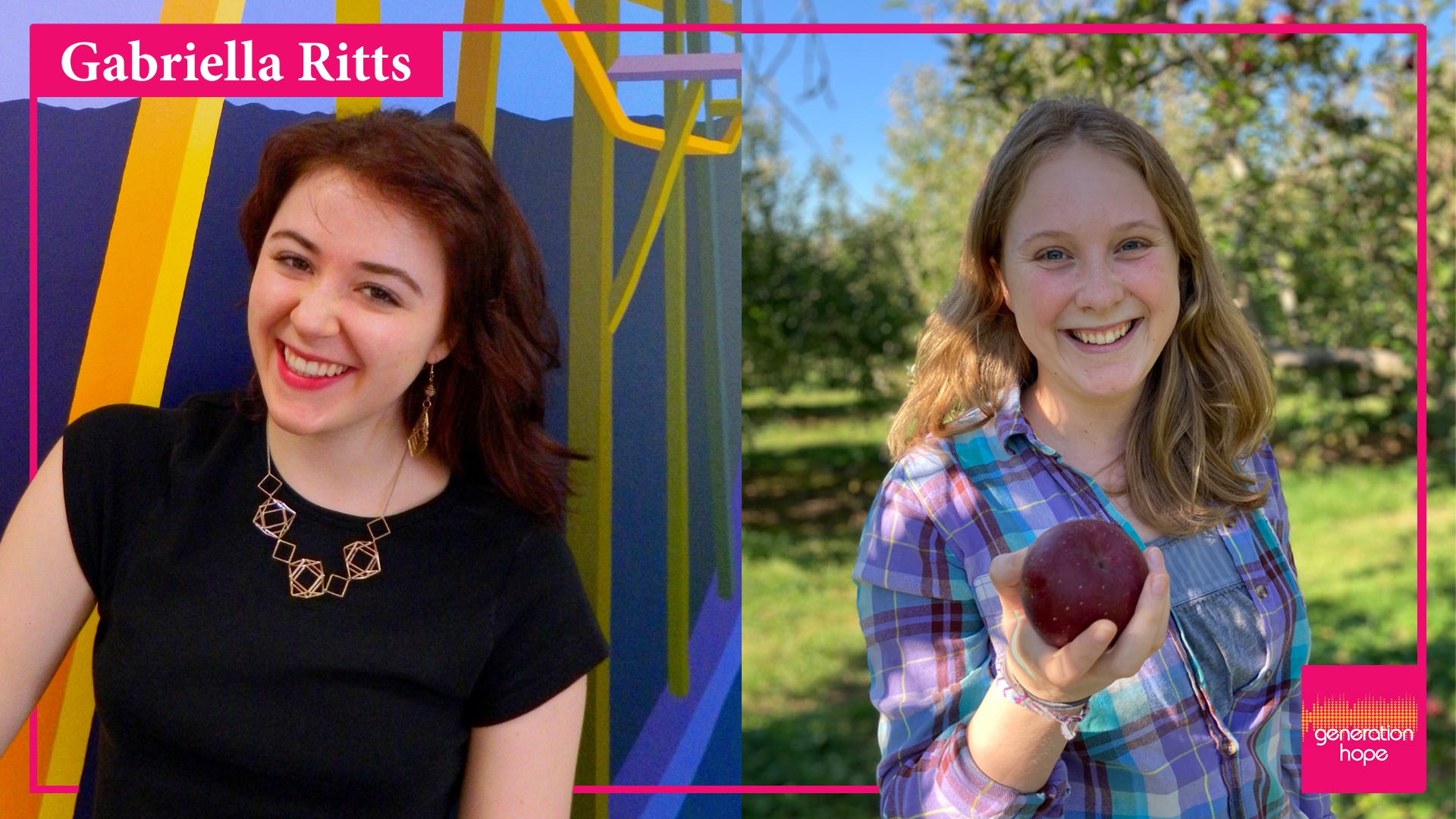
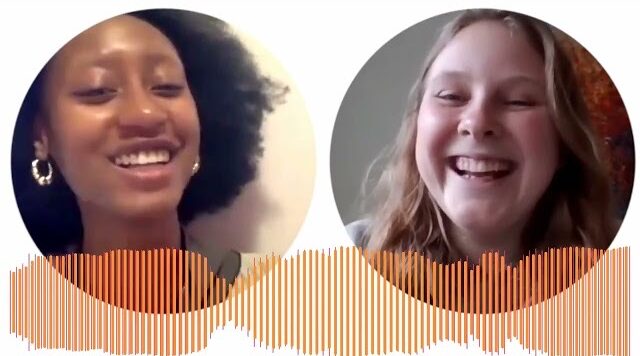
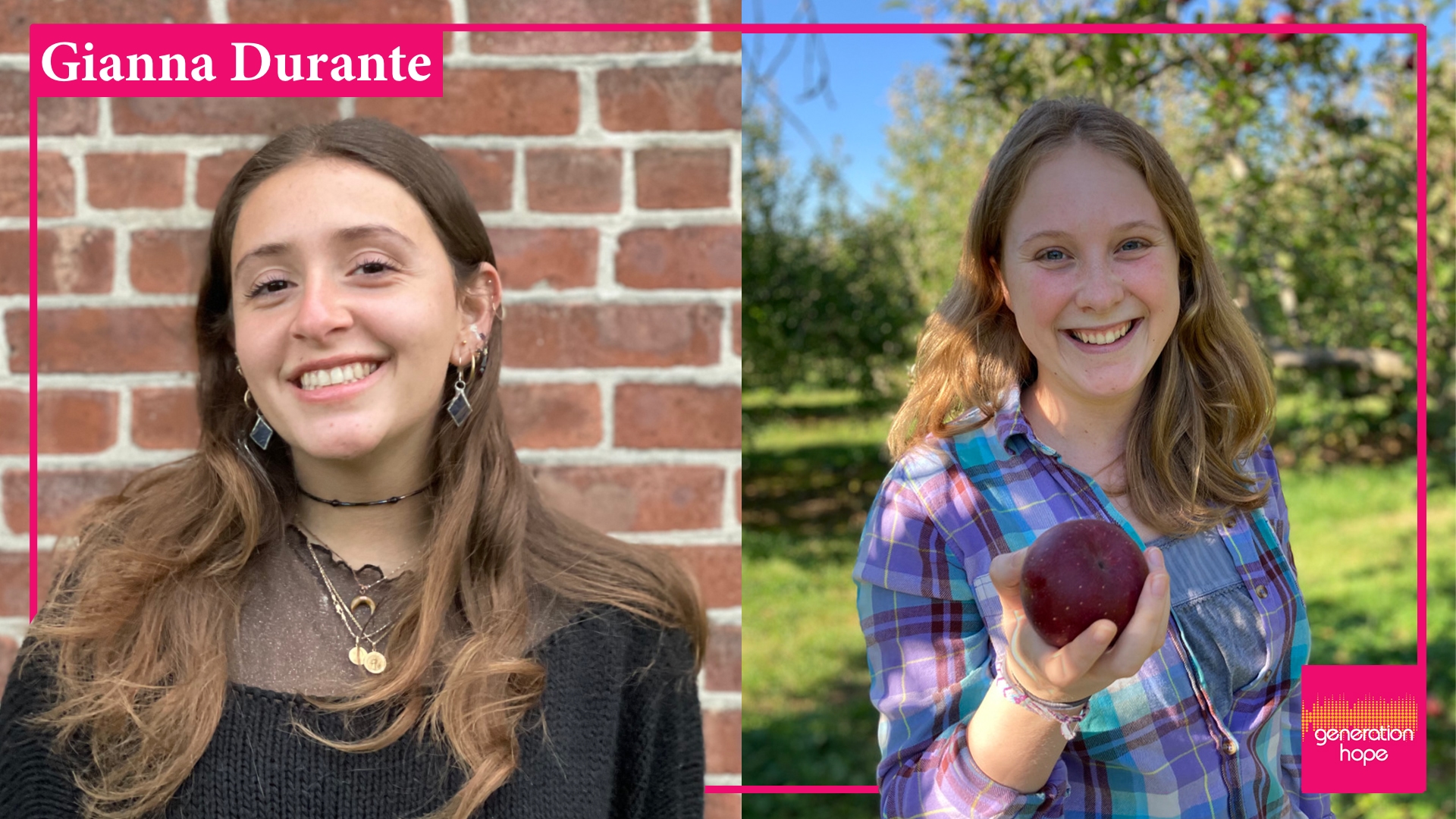
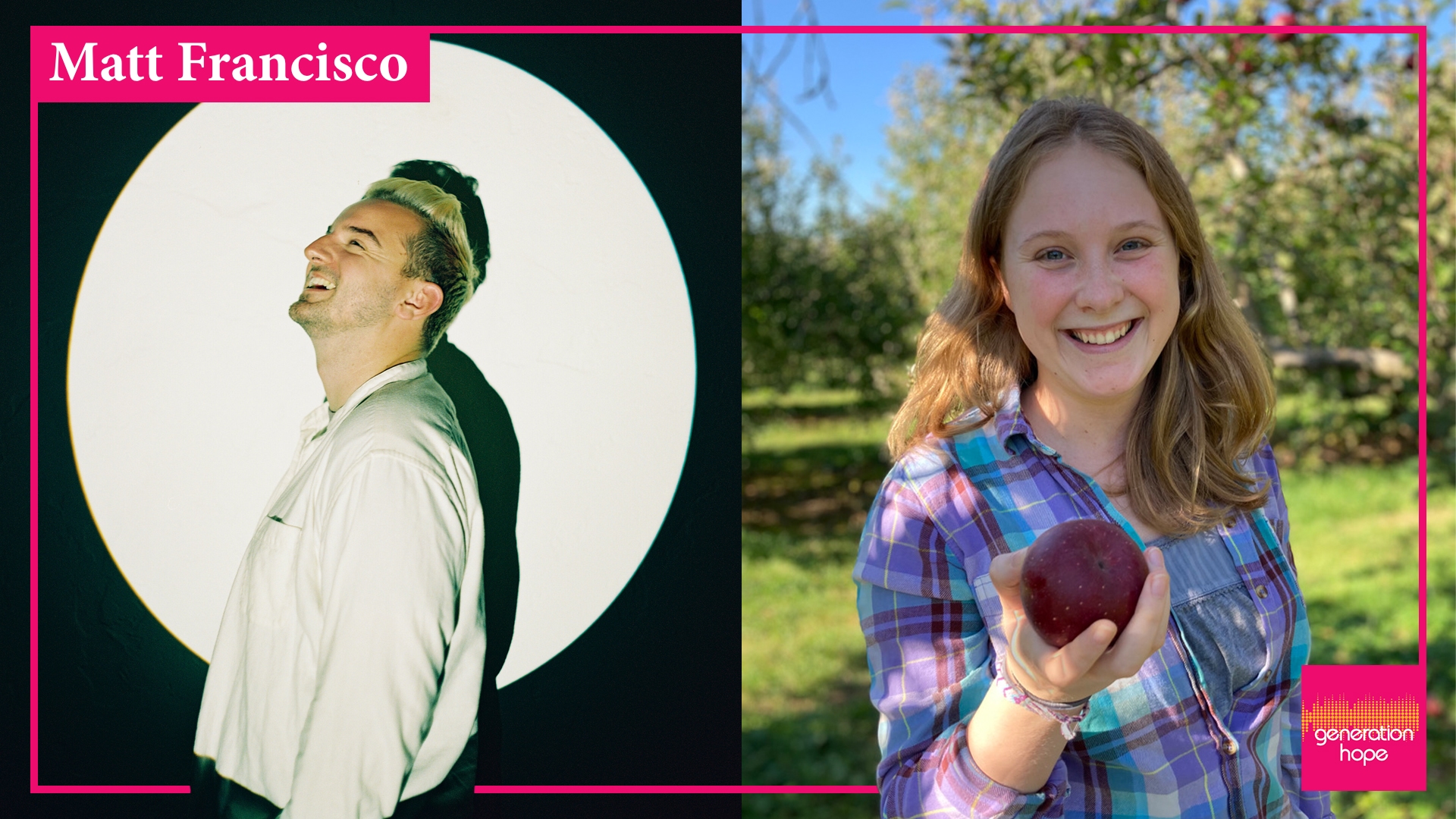
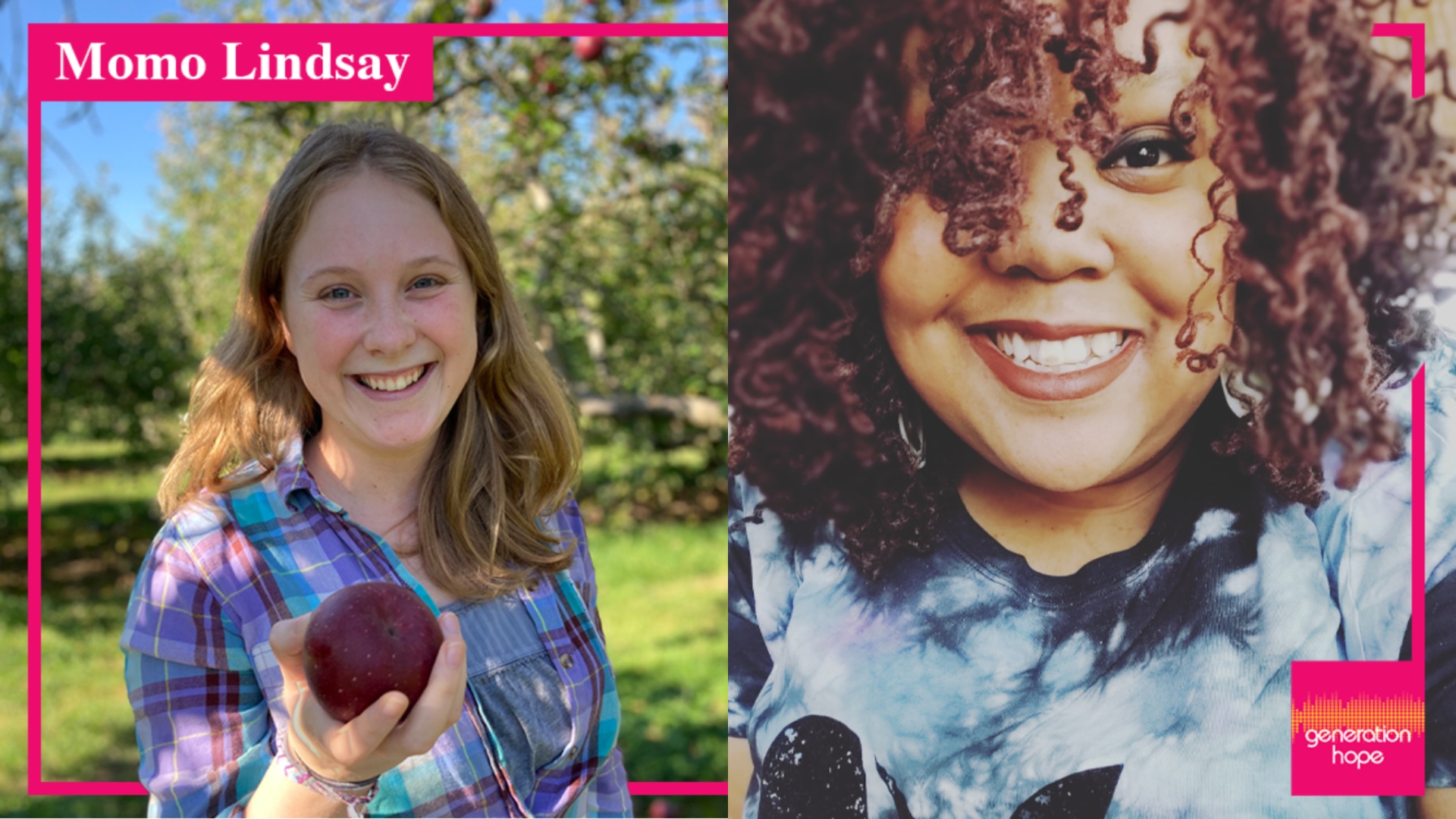

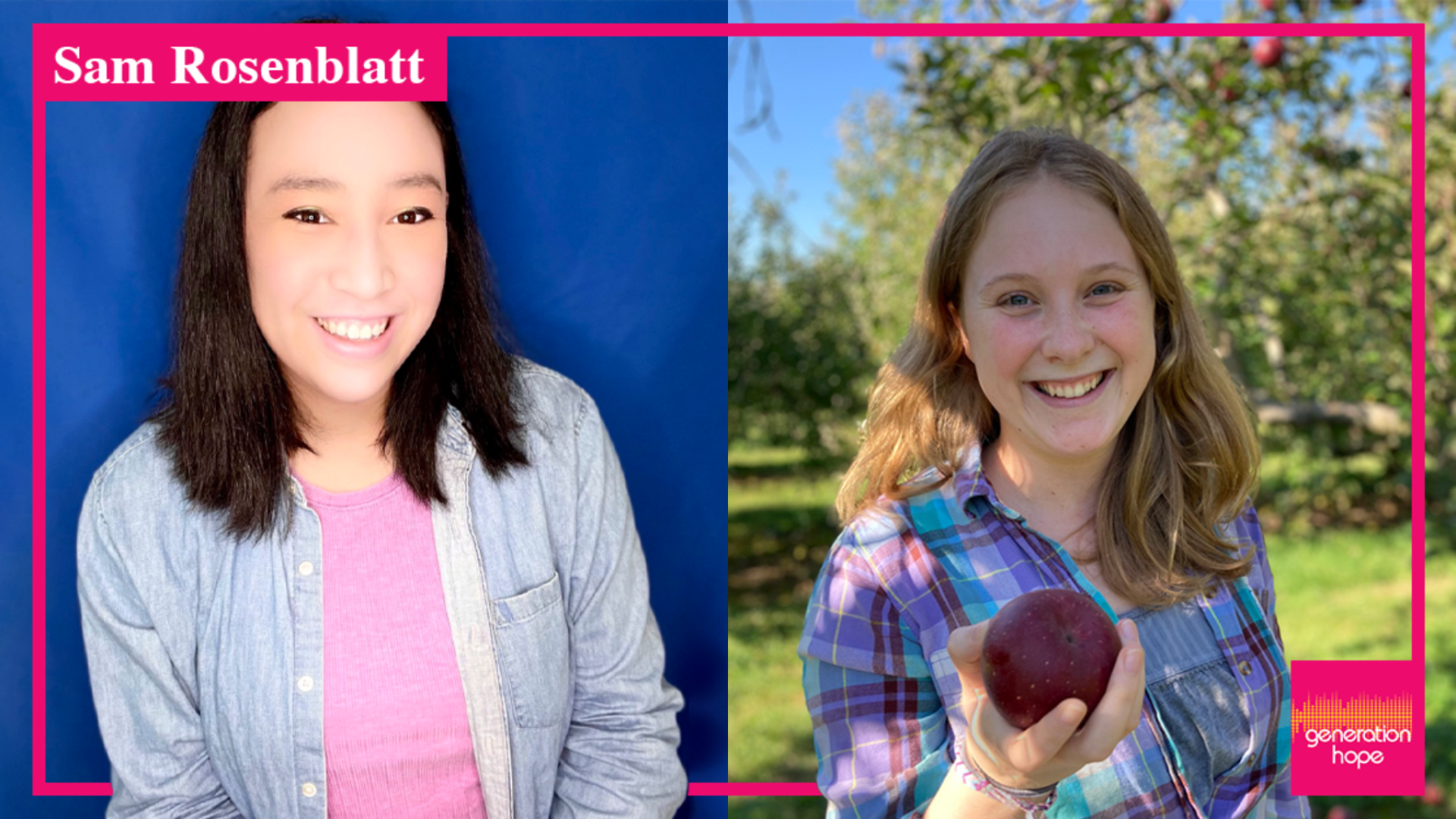
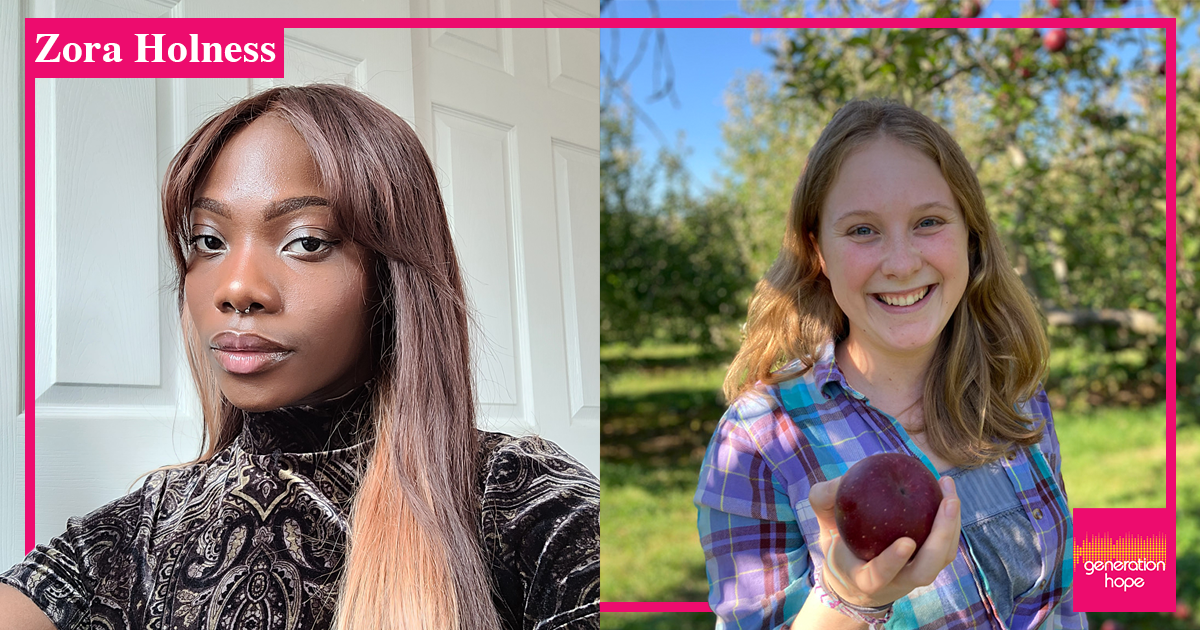
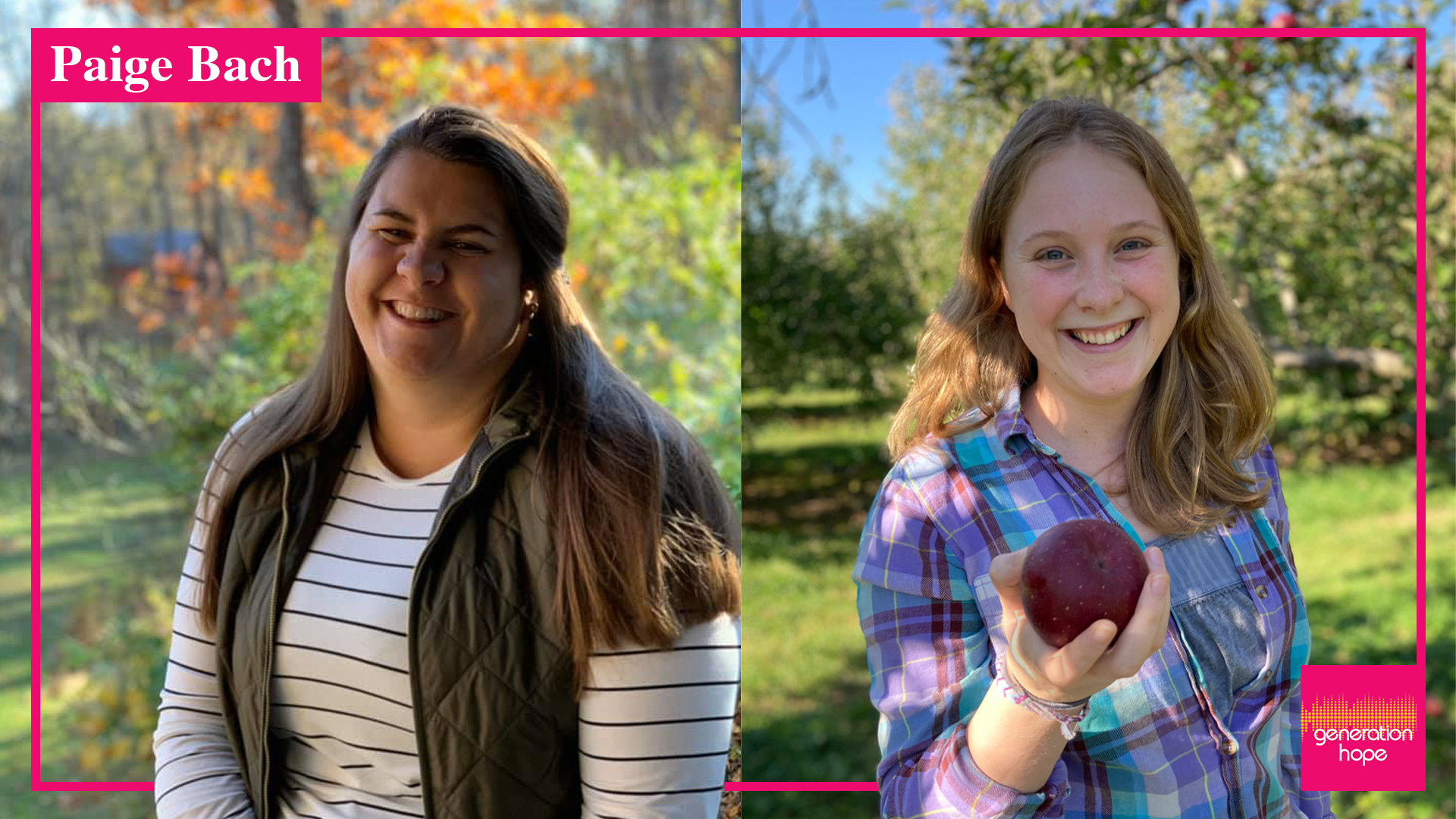
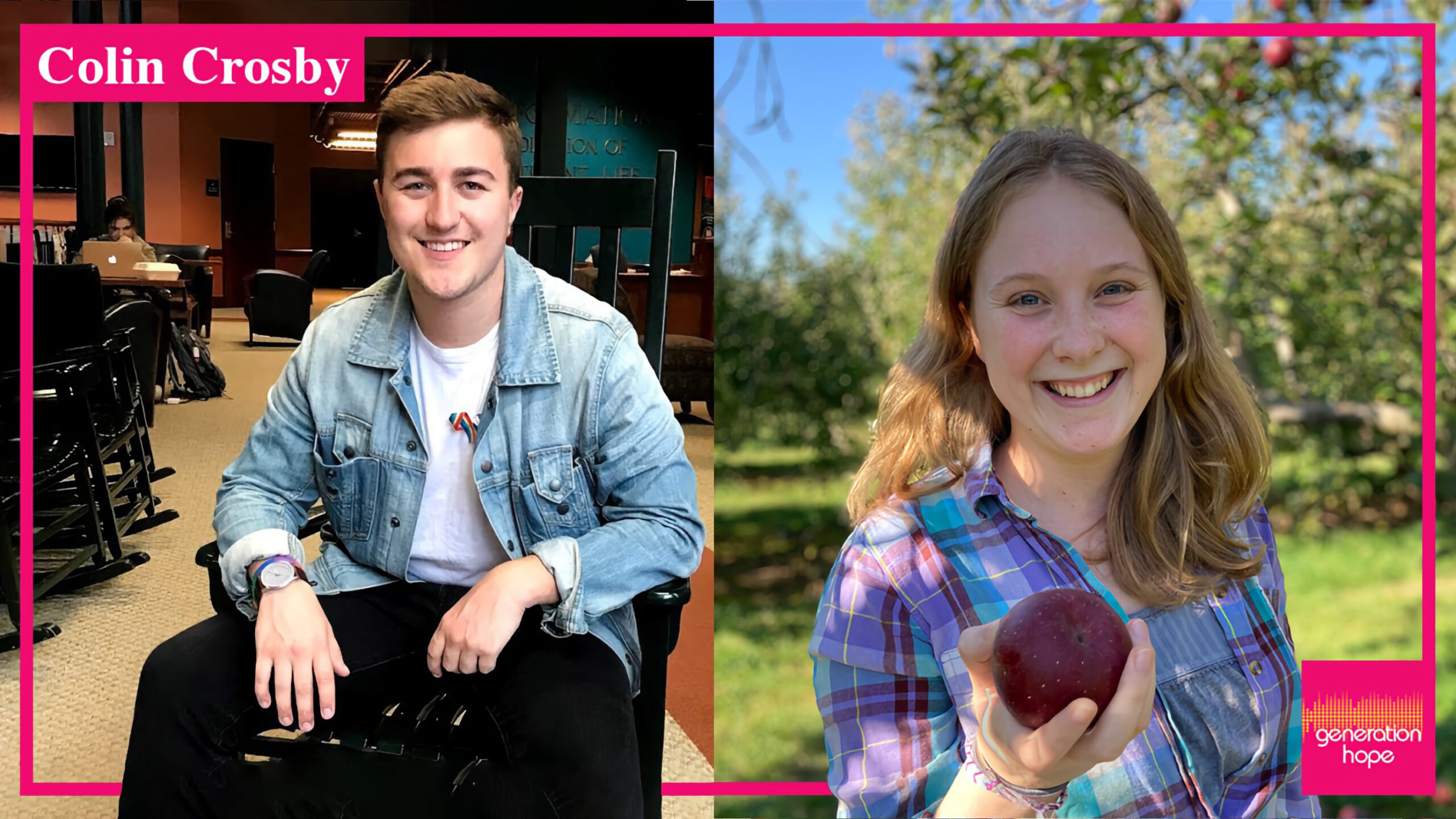
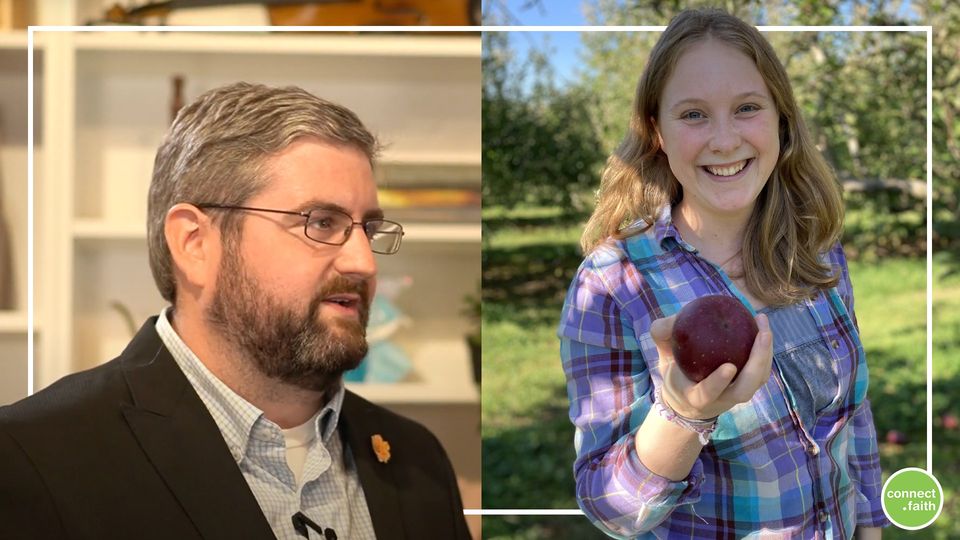
0 Comments